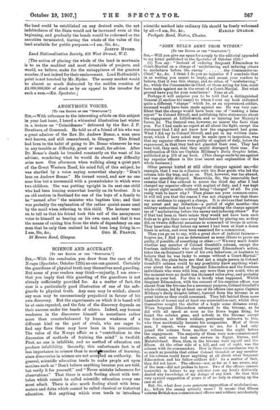SCIENCE AND ACCURACY. pro THE EDITOR Or THE 'SPECTATOR."] Sra,—With
the conclusion you draw from the case of the N-rays (Spectator, October 12th) no one can quarrel. Certainly the guardians of physical truth may themselves need guarding. " But some of your readers may think—unjustly, I am sure- that"you imply that this guarding of the guardians is not already sufficiently provided for. As a matter of fact, the case is a particularly good illustration of one of the safe- guards to physical truth. Any man may be misled ; almost any man may be unconsciously prejudiced in favour of his own discovery. But the experiments on which it is based will be it once repeated, and the fate of the discovery depends on their success under the hands of others. Indeed, any human weakness in the discoverer himself is sometimes rather more than counterbalanced by human weakness of a different kind on the part of rivals, who are eager to find any flaws there may have been in his precautions. The value of the N-rays affair as a "contribution to the discussion of methods of training the mind" is twofold.
no one is infallible, and no method of education can produce infallibility. Secondly, this unfortunate fact is of less importance in science than in mosbevanches of learning, since iliscoveries in Science are not accepted on authority. In iieneral, scientific education tends to make people act upon maxims such as "Don't believe anything because you are told, hut verify it for yourself," and "Never mistake inferences for observations." That there is much fooling about with test- tubes which cannot be called scientific education every one inust 'admit. There is also much fooling about with hexa- meters and dates which' cannot be called classical or historical education. But anything which even tends to 'introduce
scientific method into ordinary life should be freely welcomed
by all.—I am, Sir, &c., HAROLD GRAHAM. Parkgate Road, Neston, Chester.










































 Previous page
Previous page